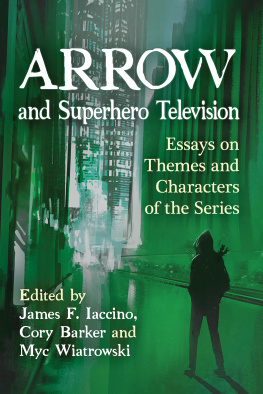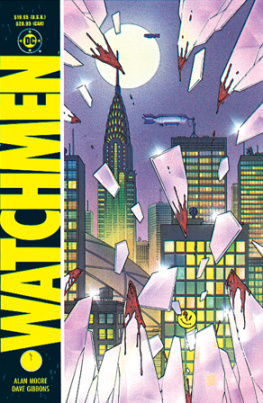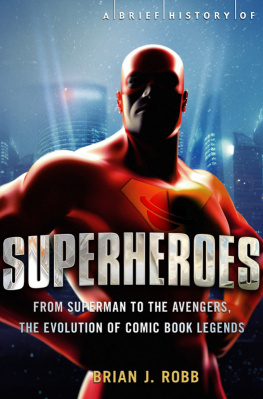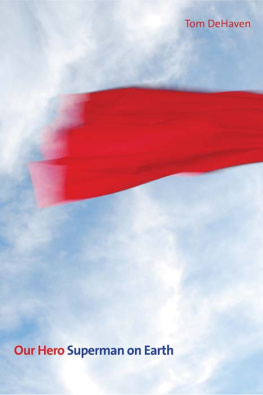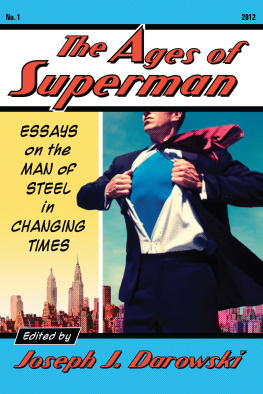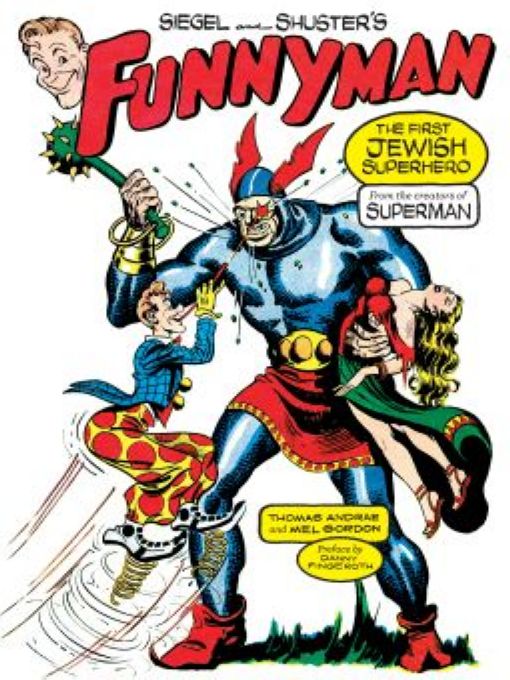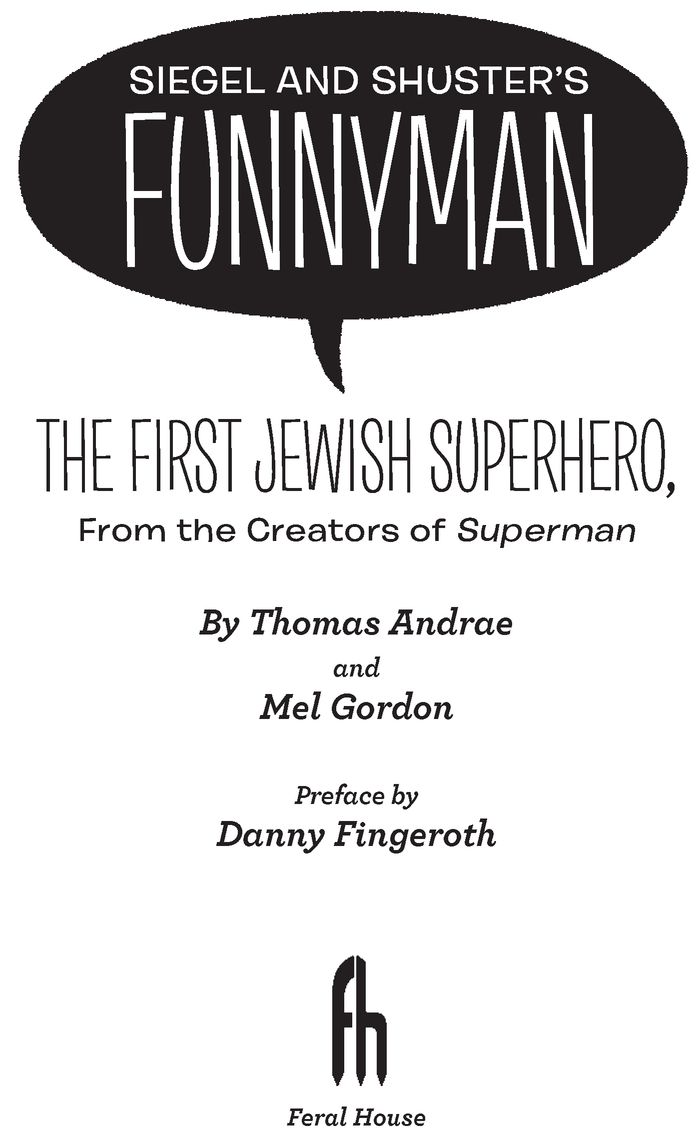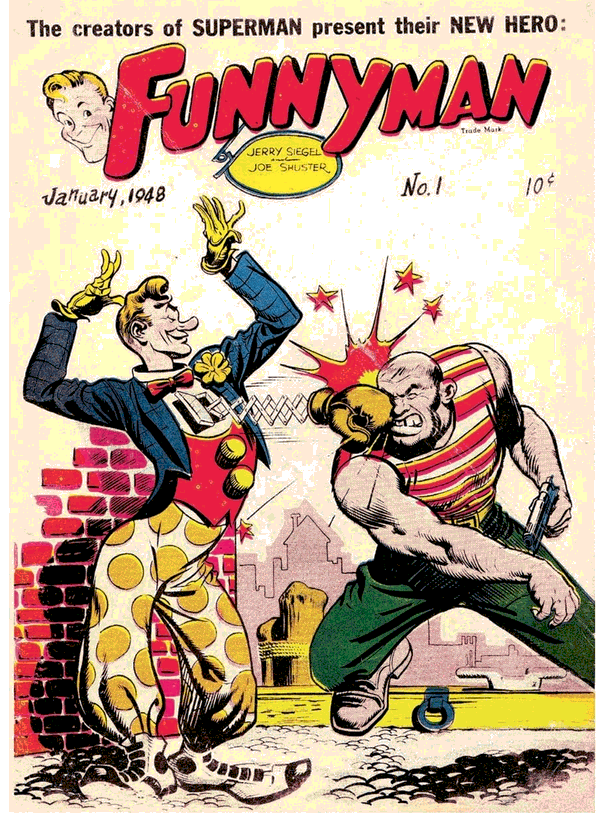Table of Contents
TO JERRY AND JOE
Preface by Danny Fingeroth
FLYING IS EASY. COMEDY IS HARD.
Zeitgeist (noun, German): the spirit of the time; general trend of thought or feeling characteristic of a particular period of time.
Dictionary.com
That zeitgeist is a tricky thing. Most creators never get to grab hold of it, while others have a knack for finding it time and time again. Some have it, lose it, have it again, lose it again. Jolson, Sinatra, Dylanthese are careers with ebb and flow, intersecting with the zeitgeist for a while, then dropping out, then returning. Some get just one really good shot at it.
In comics, Jerry Siegel and Joe Shuster, after years as creative partners, came up with the right hero at the right time:
Superman, the Man of Steel.
Debuting in 1938, Superman defined the zeitgeist of the late 30s and early 40s. Second only to, perhaps, Mickey Mouse, Superman may be the most widely recognized popular culture figure of all time. He embodies a panoply of wishes, dreams, hopes, fears, inspiration, forward-looking anticipation, and backward-gazing nostalgia. It seems like the idea of being so powerful that you can change the world, so compassionate that you only use your great power for good, and so modest that you develop a whole other identity to avoid the spotlightthat is a combination so powerful that it has never gone away, and has been reinterpreted and reinvented over and over. Can all that be chalked up to something as simple as (in the words of Jules Feiffer), If they only knew?
Maybe.
Whatever it was that Siegel and Shuster intuited, somehow this costumed adventurer was the perfect vehicle to express the hopes and anxieties of the late Depression/pre-World War II era, and to express it what turned out the be the perfect medium, the then relatively new form of the comic book.
Superman + comics books + Siegel & Shuster + National Periodicals Publications somehow ended up equaling something far greater than the sum of its parts. Superman was the hero the world had been waiting for, but didnt know it. The killer app of its day. The character was a phenomenon. Any attempt to explain himlike explaining any phenomenonis retrospective guesswork. After all, if you could figure out how to do it, then people would do it every day. And even the most talented, driven people cant predict what will be a hit and what wont.
Blame it on the zeitgeist.
True, the world was indeed ready for a hero. But the world is always ready for a hero. There are always wrongs to be righted, mistakes to be corrected, flaws to be fixed, villains to be vanquished. Why and how did Superman catch on? Why and how did the character not only ignite the collective imagination, but also spawn an endless stream of other costumed superheroes? What did Siegel and Shuster intuit that no one else did?
There are dozens of theories, and they all have some merit. Many are recounted in this very book, as well as in books by such figures as Peter Coogan, Gerard Jones, and your humble writer. But, really, none of us knows. We can take educated guesses. And we often do. Its a fun and enlightening pursuit. The theories put forth by Thomas Andrae and Mel Gordon in Funnyman: The First Jewish Superhero, are among the most interesting of the theories, and uncover fascinating possibilities for the superheros appeal that I dont think anyone else has explored from quite the same angle.
Whatever the reason, Superman took off, to not coin a phrase, like a speeding bullet. After him came Batman (who had no superpowerswhat was up with that?), The Flash, Green Lantern, Wonder Woman, Sub-Mariner, Captain America. A million of themfiguratively, if not literally. This was the so-called golden age of comics. Kids, soldiers, everybody was superhero crazy.
Were the superheroes especially Jewish? Theres certainly a case to be made for the superhero as being specifically Jewish in origin and attitude, but, again, these are retroactive assessments. And at least one Jewish creator of a major superhero denies anything Jewish about that characters creation or content.
One certainly cant deny that many of the earliest and most popular superheroes were created and/or reinvigorated by writers and artists of Eastern European Jewish backgrounds. And human nature being what it is, it seems a safe bet that, try as they might have to not let themtry as they might to have made their stories all-American (whatever that means)their backgrounds were bound to influence that content of their work.
Stereotypes are fascinating and dangerous at the same time. The same can be said for Funnyman: The First Jewish Superhero. Andrae and Gordons thesis is that, while other superheroes may have some earmarks of having been created by young men of Eastern European Jewish roots, Funnyman was more overtly Jewish than any comic book-spawned costumed adventurer that came before.
Now, until seeing this book, you had probably never heard of Funnyman. The character lasted all of six issues in the late 1940s, and for a short time as a syndicated newspaper strip. He was created by the very same Siegel and Shuster who created Superman over a decade before, by the same sensibilitiesnow more mature and with their craft more refined. Reading Funnyman, one can clearly see its the work of assured, professional graphic-storytellers (along with their highly competent art studio). The comic took a more lighthearted approach to heroic storytelling than their Superman work, although that material was certainly not without humor.
Funnyman was a comedian who donned a Cyrano-like proboscis and fought zany criminals. Like comedians of the era, including Danny Kaye (whom he resembles), Jerry Lewis, Phil Foster, and Lenny Bruce, Funnyman was a professional comedian. Unlike those comicswho often played mob-run clubsFunnyman fought crime on the side, using elements of clowning and comedy to overcome his adversaries. In a way, hes a heroic version of Batmans archfoe, the Joker. Clearly, unlike dramatic names like Superman and Batman, Funnymans code name indicateswell, its a little ambiguous just what it indicates, isnt it? Funnyman is a wink to the reader that the character is an heir to, and simultaneously a satire of, a serious, heroic-fictional tradition. But how is a villain (and hence the reader) to react to an irony-steeped crimefighter in a pre-ironic age?
Still, the concept could have worked. People always like comedians and crime-fighters. Genre satires are perennially popular, too. And if an audience likes a character, theyre unlikely to engage in theorizing about its irony or the lack thereof. So a superhero spoof that also satirized a grab bag of popular genres, written and drawn by two talented guyswhy didnt it work?
Ya got me.
Maybe he wasnt Jewish enough. Or maybe he was too Jewish. Read the Funnyman stories reprinted (for the first time in many years) in this volume, and you can decide for yourself. Is Funnyman a schlemiel? A schlimazel? A badkhen? A tummler? A shtarke? A kuneleml? (Dont worry if you dont understand the words. Theyre Yiddish for a variety of personality types.) In other words, is he a modern version of a cultural archetype? Andrae and Gordon think soand have the history to back up their theories. Your mileage may differ, but thats the fun of a book like this.


